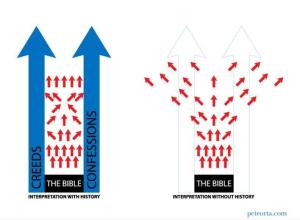As a reformed, confessional Presbyterian, I am prone to defer back to creeds and confessions when discussing theological topics. I find them extraordinarily helpful in bringing concise, biblical clarity to complex doctrinal issues. Yet, not all Christians share this appreciation. Often, I run into believers who look upon the historic creeds and confessions with a certain level of contempt. They dismiss any value and declare they have “no creed but Christ.” While I understand their sentiment, I contend their reasoning stands flawed and short-sighted. Why? Because in a shade of irony, when one insists on a blanket dismissal of creeds and confessions for a “just me and Jesus” systematic framework, they (usually unknowingly) deny the clarity and sufficiency of God’s Word.
By God’s amazing grace, the essential elements for faith and salvation are clear for almost any reader; this truly is a wonderful thing. Chapter 1, Section 7 of the Westminster Confession of Faith speaks to the perspicuity of the critical elements of scripture. The confession reads:
“those things which are necessary to be known, believed, and observed for salvation are so clearly propounded, and opened in some place of Scripture or other, that not only the learned but the unlearned, in a due use of the ordinary means, may attain unto a sufficient understanding of them.”
This perspicuity was a driving force for the Protestant Reformation. The Reformers asserted that due to the clarity and accessibility of scripture, man does not need an interpreter – such as the Roman Catholic Church. With the aid of the Holy Spirit, the essential elements of the Christian faith and salvation are understandable, accessible, and trustworthy. Scripture encourages men to read and search the Bible for themselves. Remember the Bereans? In Acts 17:10, we are told they “received the word with all eagerness, examining the Scriptures daily.” Luke continues and lets us know that “many of them believed.” Yet, Rome insists that God requires an interpreter. Justly, the Reformers pushed back on this.
So how does one claiming a “no creed but Christ” hermeneutic deny this clarity of scripture? It aims to presume, if not intentionally, that no one before him has been able to see the truth of scripture. Such a person needs no ecumenical guidance in their doctrinal discernment – they are their own authority. While this may seem like a small item to some readers, I contend it is a considerable thing. If we, in word and deed, deny the creeds and confessions, we also by implication deny the clarity of scripture and God’s faithfulness to His church over the ages. The gospel is clear, understandable, and reliable; creeds and confessions evidence this. The unity of essential doctrines between creeds and the confessions argues for the unity of God’s people across generations. To quote G.I. Williamson in his study of the Westminster Confession of Faith: “the Creeds represent the consensus of many, who therein testified that they plainly saw the same great truth revealed in the Bible”
I should clarify that this doesn’t mean that every aspect and doctrine of the Bible is easy to understand – clear is not always simple. Even the Apostle Peter points out there are “some things in them that are hard to understand” (2 Peter 3:16). G.I. Williamson helps us again by drawing an analogy to Einstein’s Theory of Relativity. He points out that one could summarize his theories clearly and concisely, which would still be difficult for many to understand (myself included). Such it is with The Word of God. It is a neverending wealth of doctrine that cannot be exhausted. Yet, in the Lord’s kindness, we find the essentials of faith and salvation communicable to all men. It is as Paul wrote in 2 Timothy 3:16-7: “All Scripture is breathed out by God and profitable for teaching, for reproof, for correction, and for training in righteousness, that the man of God may be complete, equipped for every good work.”
It is remarkable that I can recite the Nicean Creed knowing that I share doctrine, drawn from the clarity of scripture, with millions of other Christians over thousands of years. In scripture, we find hope, love, and God’s plan for the salvation of His people; the same gospel was given to the apostles. To me, this is a very comforting thought.

As Protestants, we rightly hold to Sola Scriptura, which asserts Holy Scripture as the final authority on all matters of faith and practice for the Christians. Yet, this doesn’t mean we completely ignore outside authorities, like creeds and confessions. We recognize their subservience to Holy Scripture as the final rule of authority. While also recognizing these other items can be beneficial guides and measures of doctrine. The image shown is a great example of how creeds and confession can work to guide the church in her theology.
In conclusion, though often with good intentions, the “no creed but Christ” proponent ultimately denies the perspicuity of scripture and the faithfulness of God unto His people. Confessions like the Westminster Confession of Faith and London Baptist Confession are wonderful guides of faith for any believer to read and study. Again, they do not seek to replace or upend God’s Word, rather they aim to summarize scriptures teachings for the benefit of God’s people over every age.
Anyone looking for deeper resources on the unity of the confessions might enjoy Reformed Confessions Harmonized by Joel Beeke and Sinclair Ferguson.













